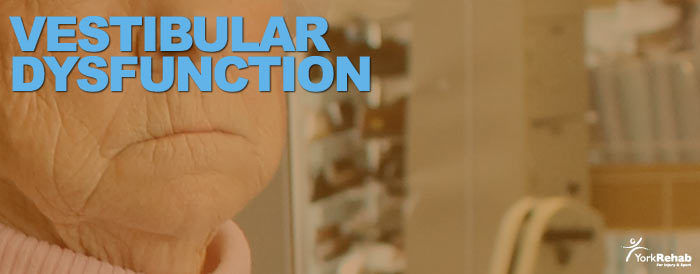
Vestibular Dysfunction


Vestibular dysfunction is quite common, especially in older people. A major symptom that one can experience is dizziness. When people get the type of dizziness called vertigo, or a sensation of the room spinning, this is often a sign of a problem with the vestibular system. The vestibular system includes the parts of the inner ear and brain that help control balance and eye movements.
The risk of falls, which increases with age, is associated with dizziness, a loss of balance, weakness, a cardiac event (i.e. heart attack) or a stroke, etc. Falls are among the leading causes of hospital admissions for elderly people.
In a recent study by Dr. Marousa Pavlou and her colleagues at King’s College in London, 25 older adults with two or more unexplained falls in the past year were compared to 16 healthy older adults.¹ Another group included in the study were 15 adults previously diagnosed with a vestibular disorder. The study focused on finding out if adults who fell were more likely to have vestibular impairment. The researchers looked at several different areas to compare the groups, including risk of falls, quadriceps strength, and walking.¹
The researchers found that 80% of adults who had multiple falls tested positive for having a vestibular disorder.¹ By comparison, only 19% of the adult non-fallers were found to have a vestibular impairment. On walking tasks, the older adult fallers had a higher risk of falling as well as significantly poorer overall performance. Similarly, when comparing the adult fallers to the group with a confirmed diagnosis of vestibular impairment, the researchers found the adult fallers had weaker quadriceps muscles .
A recent article by Dr. Will Boggs highlighted the importance of this study.² The article also quoted Dr. Yuri Agrawal (from John Hopkins University School of Medicine’s Department of Otolaryngoglogy-Head and Neck Surgery), who emphasized the increased likelihood of vestibular impairment in the elderly and likewise the increased risk of falls in those diagnosed with a vestibular disorder.
Dr. Agrawal draws attention to the need for testing for the possibility of vestibular impairment in elderly people who have experienced multiple falls.²
The importance of this research study should not be overlooked. Both the study and the article’s authors suggest that the majority of adults who experience multiple falls and test positive for vestibular impairment, improve with rehabilitation.¹´² The article recommends that older adults who fall should be tested to see if they have vestibular impairment, and if they do, they should be referred to appropriate health care professionals: ENT (Ear, Nose and Throat Doctor) for further evaluation, or to physical therapists trained in vestibular rehabilitation, who can provide vestibular training. Falls clinics or falls prevention programs and family doctors may start to look at testing their patients for vestibular impairment. In seniors testing positive for vestibular impairment, vestibular training may be an effective treatment. This article highlights the importance of testing elderly patients who have multiple falls for vestibular impairment,² and how this could directly affect the number of hospital admissions attributed to falls in the elderly.
1. Pavlou, M. et al., “Peripheral vestibular dysfunction is prevalent in older adults experiencing multiple non-syncopal falls versus age-matched non-fallers: a pilot study”, in Age and Ageing. London, UK. May 2013.
2. Boggs, W., summary article. “Peripheral vestibular dysfunction common in older adults who fall”. Reuters Health, New York, N.Y. October 10, 2013.
Comments are closed.

